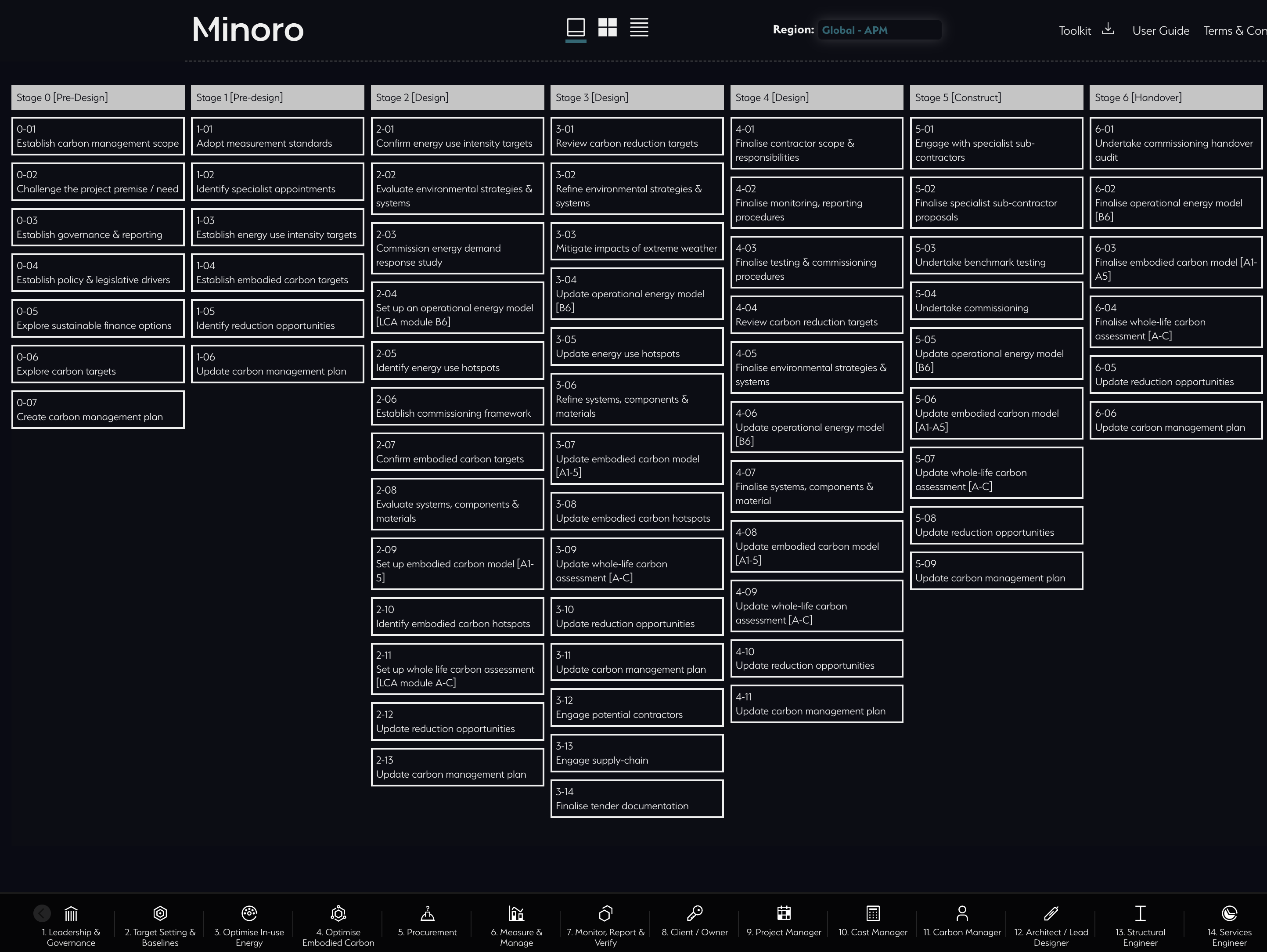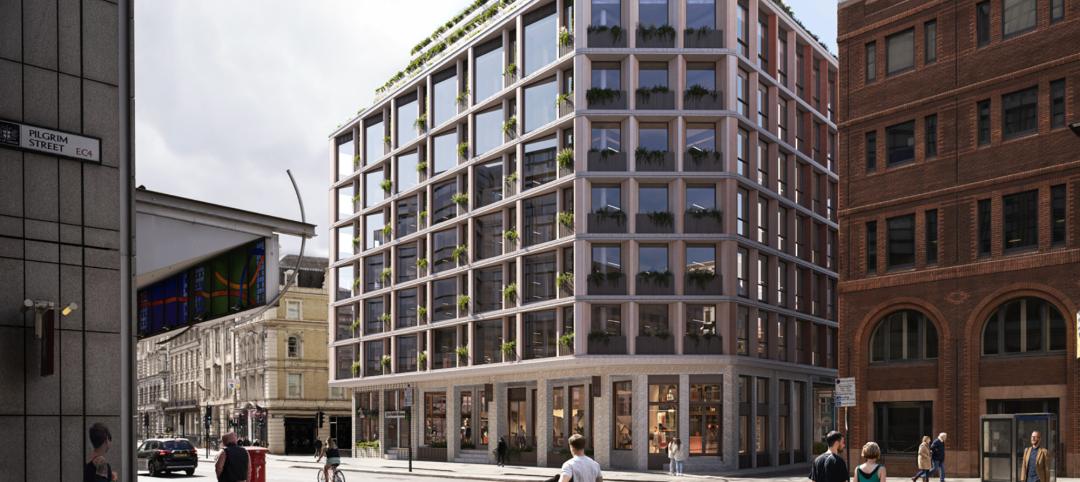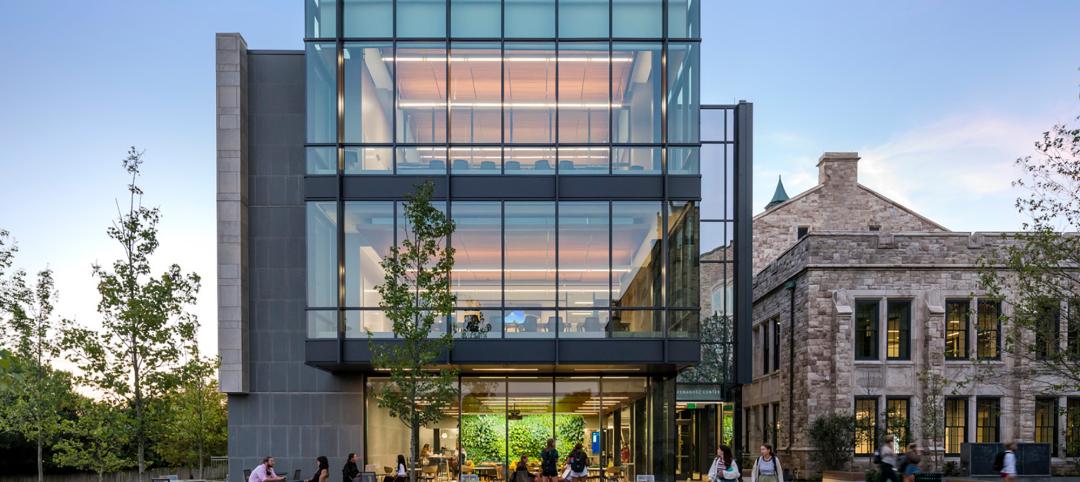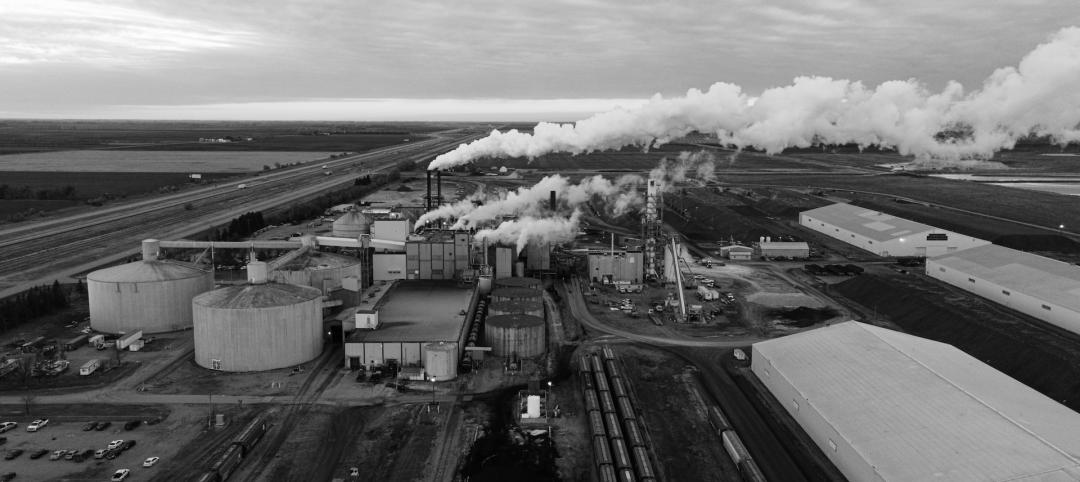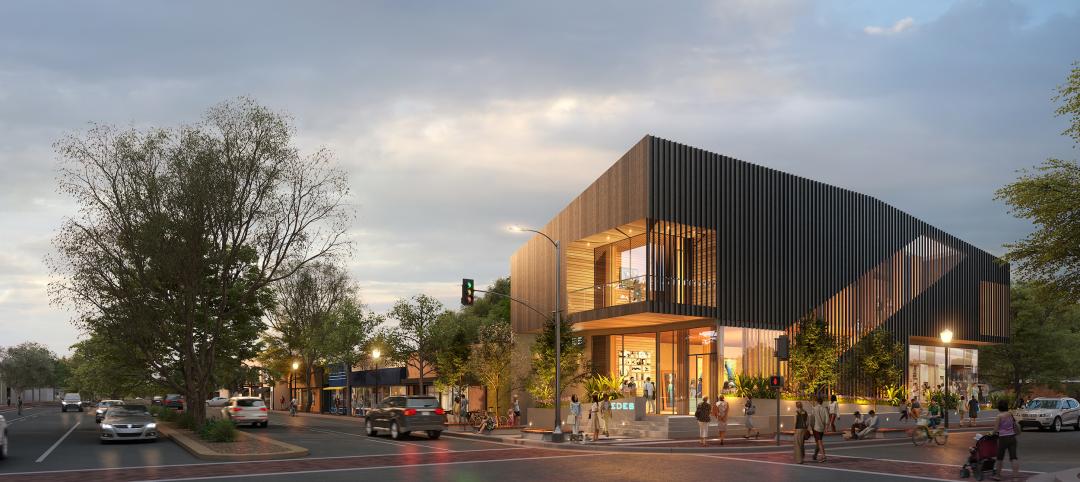Minoro, an online platform to help accelerate the decarbonization of buildings, was recently launched by architecture firm Grimshaw, in collaboration with more than 20 supporting organizations including World Business Council for Sustainable Development (WBCSD), RIBA, Architecture 2030, the World Green Building Council (WorldGBC) and several national Green Building Councils from across the globe.
The platform—minoro.org—hosts the latest guidance, methodologies, and policies on carbon management, linking the resources to a series of actions that can decarbonize new and existing buildings. This is the first time this information has been collated and centralized, according to a news release.
Free to use, the platform hosts global information and specific guidance supporting key regions including the U.K., Europe, U.S. and Canada, Australia and New Zealand. Information hosted on the platform has been contributed and reviewed by peers and organizations and will continue to be updated and informed with the latest information with more countries and regions planned to be included.
The tool can filter information from concept to operation, through specific actions or targets such as embodied carbon or procurement, or by responsibility from a client to supplier. The platform enables asset owners, investors, design teams, consultants, contractors and building operators to set targets and develop clear informed actions across every stage of a building life cycle. Responsibilities, and opportunities to reduce carbon emissions and meet targets and ambitions can be clearly identified.
Here is the full press release on the launch of Minoro:
Minoro, a new online platform designed to help accelerate the decarbonisation of buildings has been launched. Developed by Grimshaw in collaboration with over 20 supporting organisations including World Business Council for Sustainable Development (WBCSD), RIBA, Architecture 2030, the World Green Building Council (WorldGBC) and several national Green Building Councils from across the globe, Minoro – minoro.org – hosts the latest guidance, methodologies, and policies on carbon management, linking the resources to a series of actions that will decarbonise new and existing buildings.
An international resource Minoro provides links and access to over 1000 policies, guidance and methodologies, the first time this information has been collated and centralised. With the ability to filter information - from concept to operation, through specific actions or targets such as embodied carbon or procurement, or responsibility from a client to supplier - the platform enables asset owners, investors, design teams, consultants, contractors and building operators, to set targets and develop clear informed actions across every stage of a building life cycle. Responsibilities, and opportunities to reduce carbon emissions and meet targets and ambitions can be clearly identified and actioned.
Free to use, the platform currently hosts global information and specific guidance supporting key regions including the UK, Europe, US and Canada, Australia and New Zealand. Information hosted on the platform has been contributed and reviewed by peers and organisations and will continue to be updated and informed with the latest information with more countries and regions planned to be included.
“Developed over two years, Minoro not only brings, for the first time, all the key information to help tackle carbon in our buildings together in one place, but will also, importantly, bring teams together to work more effectively, aligning actions and maximising opportunities to avoid unnecessary carbon emissions in building projects,” said Paul Toyne, Sustainability Lead, Grimshaw.
“We know that buildings contribute almost 40% of the global energy related carbon emissions, but equally the route to decarbonising buildings is complex. The opportunity brought by Minoro is to help navigate this complexity and bring building owners and their project teams closer together in the setting of high ambitions and realising the incredible responsibility all stakeholders have to take effective action,” said Roland Hunziker Director, Built Environment, World Building Council for Sustainable Development.
"It's fantastic to see this project take off! Shaped by global expertise and bridging diverse disciplines within the built environment, Minoro is an impressive free resource for professionals across the value chain. It facilitates informed decisions to slash emissions and embodies the collaborative spirit of UKGBC, WorldGBC, and other GBCs. I hope Minoro will help our networks to drive forward climate action like never before!" said Smith Mordak, Chief Executive, UKGBC.
“Architects play a pivotal role in decarbonizing the built environment. Minoro, developed from the collective experience of stakeholders worldwide, supports both newcomers and seasoned professionals in collaborating through a common design and building process that builds on existing industry practice,” said Davina Rooney, CEO, Green Building Council Australia.
“Minoro comes a critical time for our industry. The access to guidelines and positive action, and the responsibility it identifies for all stakeholders in the project life cycle will serve to accelerate the change we need. Equally, the input and support of all the organisations behind its development is evidence of how vital collaborative action is,” said Andrew Whalley, OBE, Chairman, Grimshaw.
About Minoro
Minoro can be accessed via minoro,org. It has been developed over the past two years by Grimshaw and the WBCSD with the support of the WorldGBC. At its heart is the urgent action to address the decarbonisation of buildings, but also the responsibility, of all stakeholders in the built environment, to work collaboratively to turn targets into action. It supports the critical path of early-stage design and business case buy-in, the recognition of national and regional targets, and the implementation of innovation, design and financial incentives to surpass decarbonisation expectations.
A carbon management toolkit is also available on the platform to help users to track actions, identify opportunities and create a plan. Constantly reviewed and updated, feedback and contributions to Minoro platform can be provided through the feedback link on the website. It has been developed for and with the built environment industry and will continue to be managed as the most reliable platform for the latest policy, guidelines and methodologies to decarbonise buildings.
Related Stories
Sustainability | Jul 13, 2023
Deep green retrofits: Updating old buildings to new sustainability standards
HOK’s David Weatherhead and Atenor’s Eoin Conroy discuss the challenges and opportunities of refurbishing old buildings to meet modern-day sustainability standards.
Mass Timber | Jul 11, 2023
5 solutions to acoustic issues in mass timber buildings
For all its advantages, mass timber also has a less-heralded quality: its acoustic challenges. Exposed wood ceilings and floors have led to issues with excessive noise. Mass timber experts offer practical solutions to the top five acoustic issues in mass timber buildings.
Adaptive Reuse | Jul 6, 2023
The responsibility of adapting historic university buildings
Shepley Bulfinch's David Whitehill, AIA, believes the adaptive reuse of historic university buildings is not a matter of sentimentality but of practicality, progress, and preservation.
Contractors | Jun 30, 2023
Construction industry task force aims for standardized carbon reporting
A newly formed Associated General Contractors of America (AGC) task force on decarbonization and carbon reporting will address the challenges around reporting and reducing carbon emissions in the construction industry.
Apartments | Jun 27, 2023
Dallas high-rise multifamily tower is first in state to receive WELL Gold certification
HALL Arts Residences, 28-story luxury residential high-rise in the Dallas Arts District, recently became the first high-rise multifamily tower in Texas to receive WELL Gold Certification, a designation issued by the International WELL Building Institute. The HKS-designed condominium tower was designed with numerous wellness details.
Green | Jun 26, 2023
Federal government will spend $30 million on novel green building technologies
The U.S. General Services Administration (GSA), and the U.S. Department of Energy (DOE) will invest $30 million from the Inflation Reduction Act to increase the sustainability of federal buildings by testing novel technologies. The vehicle for that effort, the Green Proving Ground (GPG) program, will invest in American-made technologies to help increase federal electric vehicle supply equipment, protect air quality, reduce climate pollution, and enhance building performance.
Industrial Facilities | Jun 20, 2023
A new study presses for measuring embodied carbon in industrial buildings
The embodied carbon (EC) intensity in core and shell industrial buildings in the U.S. averages 23.0 kilograms per sf, according to a recent analysis of 26 whole building life-cycle assessments. That means a 300,000-sf warehouse would emit 6,890 megatons of carbon over its lifespan, or the equivalent of the carbon emitted by 1,530 gas-powered cars driven for one year. Those sobering estimates come from a new benchmark study, “Embodied Carbon U.S. Industrial Real Estate.”
Mechanical Systems | Jun 16, 2023
Cogeneration: An efficient, reliable, sustainable alternative to traditional power generation
Cogeneration is more efficient than traditional power generation, reduces carbon emissions, has high returns on the initial investment, improves reliability, and offers a platform for additional renewable resources and energy storage for a facility. But what is cogeneration? And is it suitable for all facilities?
Resiliency | Jun 14, 2023
HUD offers $4.8 billion in funding for green and resilient building retrofit projects
The Department of Housing and Urban Development (HUD) recently released guidelines for its Green and Resilient Retrofit Program (GRRP) that has $4.8 billion for funding green projects.
Mass Timber | Jun 13, 2023
Mass timber construction featured in two-story mixed-use art gallery and wine bar in Silicon Valley
The Edes Building, a two-story art gallery and wine bar in the Silicon Valley community of Morgan Hill, will prominently feature mass timber. Cross-laminated timber (CLT) and glulam posts and beams were specified for aesthetics, biophilic properties, and a reduced carbon footprint compared to concrete and steel alternatives.


